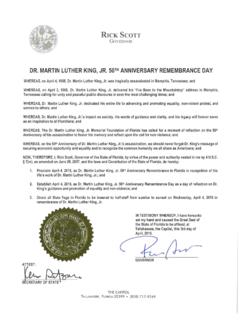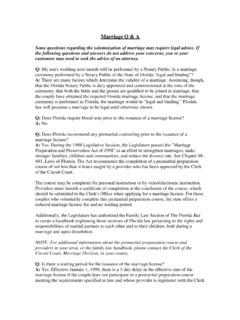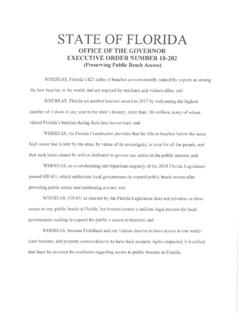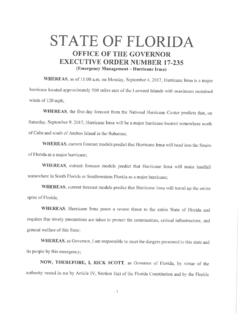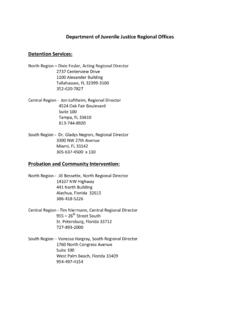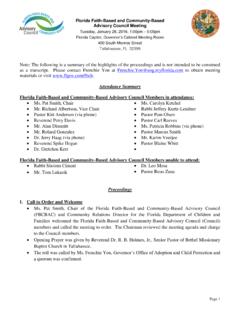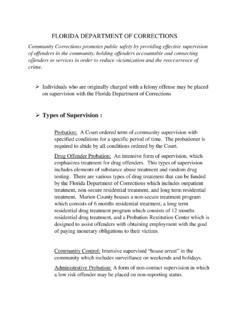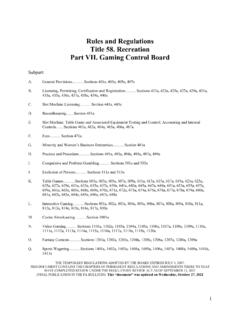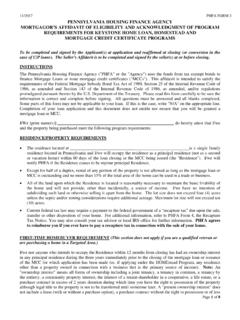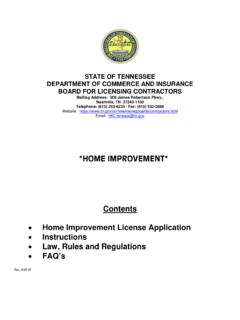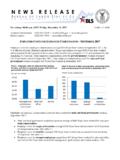Transcription of Governor’s
1 governor s Reference Manual for Notaries Public State of Florida 2 PUBLISHED BY: State of Florida Executive Office of the governor Notary Section Tallahassee, Florida 32399-0001 PREPARED BY: Emily Burns Notary Coordinator PUBLICATION DATE: December 13, 2016 PLEASE NOTE: This manual has been prepared to educate Florida notaries public about the laws governing their duties and is not intended as legal advice. For additional information regarding the laws governing Florida notaries public, it may be advisable for you or your customer to seek the advice of a licensed attorney. 3 Contents Resources for Florida Notaries Public 4 Office of Notary Public 6 What is a Notary Public? 6 Qualifications and Requirement for Appointment 6 Appointment, Commission, and Jurisdiction 7 Application Process 7 Renewal of Notary Public Commission 8 Surety bond 8 Notary Public Seal and Commission Certificate 8 Change of Address, Telephone Number.
2 Or Criminal Record 9 Resignation of Notary Public Commission 9 Performing Notarial Acts 10 Notarial Certificates or Jurats 10 Identifying the Signer 10 Notary Public Fees 11 Electronic Notarization 11 Keeping Records via a Notary Journal 12 Refusal of Notary Services 12 Duties of Notaries Public 13 Administration of Oaths 13 Taking Acknowledgments 14 Solemnizing Marriages 16 Attesting to Photocopies 17 Verifying Vehicle Identification Numbers (VINs) 17 Certifying Contents of Safe-Deposit Boxes 17 Statutory Short Forms of Acknowledgment 18 Prohibited Acts 20 Notaries Public in Special Positions 22 Government Employees 22 Law Enforcement and Correctional Officers 22 Military Officers 23 Civil-Law Notaries 23 Apostille Certification: Authentication of Notarized Documents by the Secretary of State 24 Certification Fees 24 Processing Time 25 Procedures 25 Appendix A: Change of Home or Business Address 26 Appendix B: Moving Out-of-State Required Resignation 27 Appendix C: General Use Resignation 28 4 Resources for Florida Notaries Public Contact the Executive Office of the governor 's Notary Section: To learn how to obtain educational materials.
3 To file a complaint against a notary public. To respond to a complaint filed against you for notary misconduct. To resign your notary public commission. Executive Office of the governor Notary Section The Capitol, Suite 209 400 S. Monroe St. Tallahassee, FL 32399-0001 (850) 717-9310 Also, be sure to check out the Notary Section of the Executive Office of the governor on the governor s website for answers to your Florida notary public questions: Contact the Department of State s Notary Commissions and Certifications Section: To report a change in your home address, business address, telephone number, or criminal record. To obtain information about a particular notary public or a notary public's surety bond . To obtain a list of the bonding agencies approved to process notary public commission applications. To report your notary public seal as lost or stolen.
4 To request authentication of a notary public's commission for a document being sent to another state or a foreign country ( a Certificate of Notarial Authority or an Apostille). Department of State Notary Commissions and Certifications Section Box 6327 Tallahassee, FL 32314 (850) 245-6975 (Notary Commissions and Certifications) (850) 245-6945 (Apostille) Another website that may interest you is that of the Department of State s Notary Commissions and Certifications Section, where you can search for Florida notaries public, access the Notary Education Program, obtain a list of notary public bonding agencies, learn about Apostille certification, and more: 5 Contact your Bonding Agency: To obtain and submit an application for appointment as a notary public. To check the status of your pending notary public commission application. To amend your notary public commission after a lawful name change.
5 To receive information about your notary public surety bond , or optional errors and omissions insurance. To purchase a notary public seal. To request a duplicate copy of your notary public commission certificate. Check out these other helpful websites for Florida notaries public: Florida Statutes Citizenship and Immigration Services State Department Office of Authentications 6 Office of Notary Public What is a Notary Public? A notary public is a public officer appointed and commissioned by the governor whose function is to administer oaths (or affirmations); to take acknowledgments; to attest to the trueness of photocopies of certain documents; and to perform other duties specified by Florida law. Qualifications and Requirements for Appointment You may only be commissioned in your legal first name (or a nickname of your legal first name, within reason) and your legal last name; the inclusion of your legal middle name or initial in your commissioned name is optional.
6 For example, John Quinton Public could be commissioned as: John Quinton Public John Q. Public John Public Johnny Quinton Public Johnny Q. Public Johnny Public For notarial certificates, your notary public seal and the name you type, print, or stamp beneath your signature must bear the legal name for which you are commissioned. However, you must sign notarial certificates with your official signature as it appears on the oath of office for your notary public commission application. You must be at least 18 years of age. You must be a legal resident of Florida. There is no certain length of time required to establish residency. However, if the governor s Office requires proof of residency, the following methods, along with the applicant s intent to reside in Florida, would be acceptable: Florida driver license; Florida ID card; Homestead Exemption; tax form; voter s registration card; recorded Declaration of Domicile; or sworn affidavit.
7 For permanent resident aliens: A permanent resident alien may apply and be appointed and shall file with his or her application a recorded Declaration of Domicile. Fla. Stat. (1). If ever convicted of a felony charge, you must have your civil rights restored, pursuant to Article VI, section 4(a) of the Florida Constitution. If ever convicted of a felony, or if ever had adjudication withheld or sentence suspended for a felony offense, you must submit the following documents: Written statement regarding the nature and circumstances of the charge(s); Copy of the court judgment and sentencing order, or a comparable court document; and If convicted, copy of the Certificate of Restoration of Civil Rights (or pardon). The name of this document may vary depending on the state where the conviction occurred. If the conviction occurred in a state that does not provide a document of this nature upon the restoration of civil rights, the applicant is responsible for providing explanation and substantial evidence as proof of the fact.
8 This information is required whether the felony charges were brought by the State of Florida, another state, or the United States. If adjudication was withheld and civil rights were not forfeited, the written statement and court documents are sufficient. To obtain information about the restoration of civil rights, you may contact: Office of Executive Clemency 4070 Esplanade Way Tallahassee, FL 32399-2450 (850) 488-2952 7 Pursuant to Section (2), Florida Statutes, you must take the constitutional oath of office. As part of the oath of office, pursuant to Section (3), Florida Statutes, you must also swear (or affirm) that you have read Chapter 117, Florida Statutes, and any amendments thereto, and know the duties, responsibilities, limitations, and powers of a Florida notary public; and that you will well and faithfully perform the duties of Notary Public, State of Florida.
9 A first-time applicant for a notary commission must submit proof that the applicant has, within 1 year prior to the application, completed at least 3 hours of interactive or classroom instruction, including electronic notarization, and covering the duties of the notary public. Courses satisfying this section may be offered by any public or private sector person or entity registered with the Executive Office of the governor and must include a core curriculum approved by that office. Fla. Stat. (11)(b). Appointment, Commission, and Jurisdiction Notaries public are public officers appointed and commissioned by the governor . You are not licensed; you are appointed. An appointment is a privilege, not a right. Notaries public shall be appointed for 4 years and shall use and exercise the office of notary public within the boundaries of this state. Fla. Stat. (1). For example, a commission which began on December 1, 2016 (12:00 ), will end on November 30, 2020 (11:59 ).
10 Additionally, regarding jurisdiction: Section (4)(a), Florida Statutes, provides that, when notarizing a signature, a notary public shall complete a jurat or notarial certificate containing the venue stating the location of the notarization in the format, State of Florida, County of _____. Application Process Since July 1, 1996, applications have been submitted by bonding agencies both in paper format and in an electronic format approved by the Department of State s Notary Commissions and Certifications Section. Pursuant to Section (2), Florida Statutes, the application form is prescribed by the Department of State and consists of three parts: (1) Personal information: full name; residence address and telephone number; business address and telephone number; date of birth; race; sex; social security number; citizenship status; driver license number or the number of other official state-issued identification; a list of all professional licenses and commissions issued by the state during the previous 10 years and a statement as to whether or not the applicant has had such license or commission revoked or suspended; a statement as to whether or not the applicant has been convicted of a felony; and if there has been a felony conviction, a statement of the nature of the felony and restoration of civil rights.
